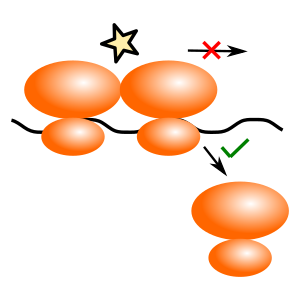Our research program focuses on the process of mRNA translation by which proteins are produced in all living cells. Our goal is to uncover new molecular mechanisms that regulate mRNA translation and to establish their relevance to human diseases caused by aberrant mRNA translation. Towards this goal, we use a variety of experimental and computational tools including Ribo-Seq, RNA-Seq, CRISPR-based genome editing, kinetic modeling, and bioinformatic analyses. We use human cell lines and the budding yeast S. cerevisiae as experimental systems.
In recent studies, we have identified a novel role for synonymous codon usage in regulating elongation rate and protein expression from mammalian mRNAs during amino acid limitation (Darnell 2018). We have also found that collisions between multiple ribosomes serve as a signal for cells to recognize and rescue stalled ribosomes (Ferrin 2017, Park 2019).
